中考英语复习语法突破第四节代词 课件(共53张PPT)
文档属性
| 名称 | 中考英语复习语法突破第四节代词 课件(共53张PPT) |  | |
| 格式 | ppt | ||
| 文件大小 | 910.0KB | ||
| 资源类型 | 教案 | ||
| 版本资源 | 通用版 | ||
| 科目 | 英语 | ||
| 更新时间 | 2024-03-01 16:58:28 | ||
图片预览

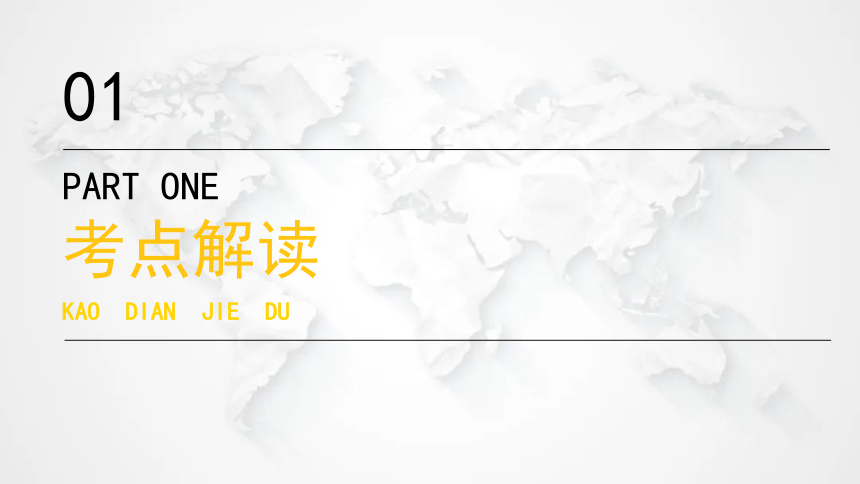
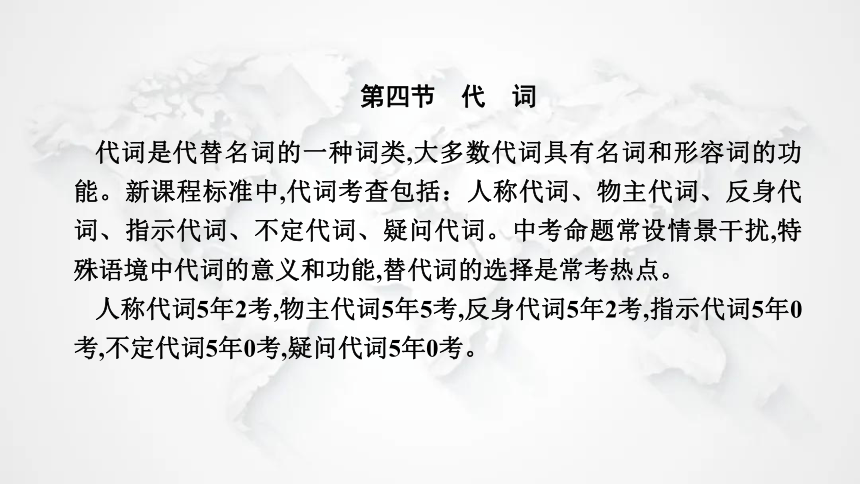
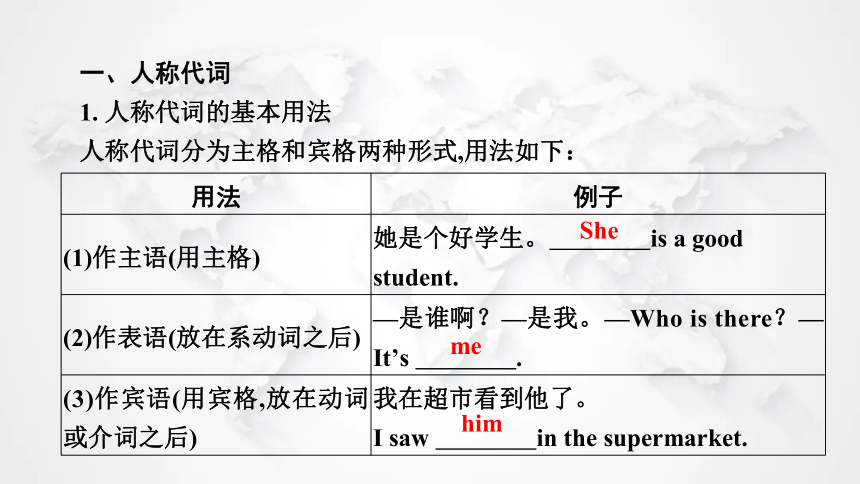
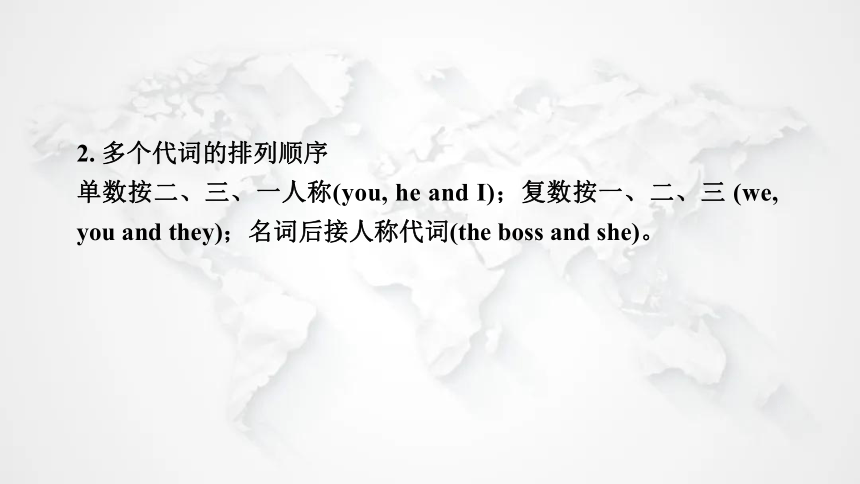
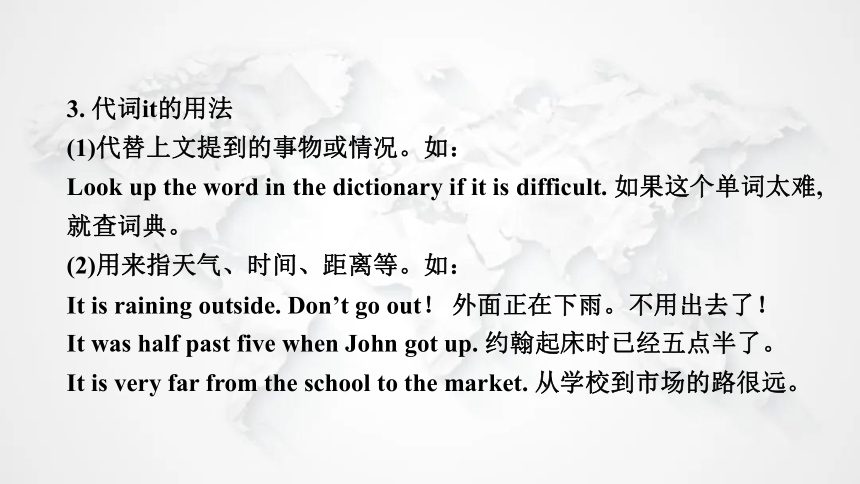
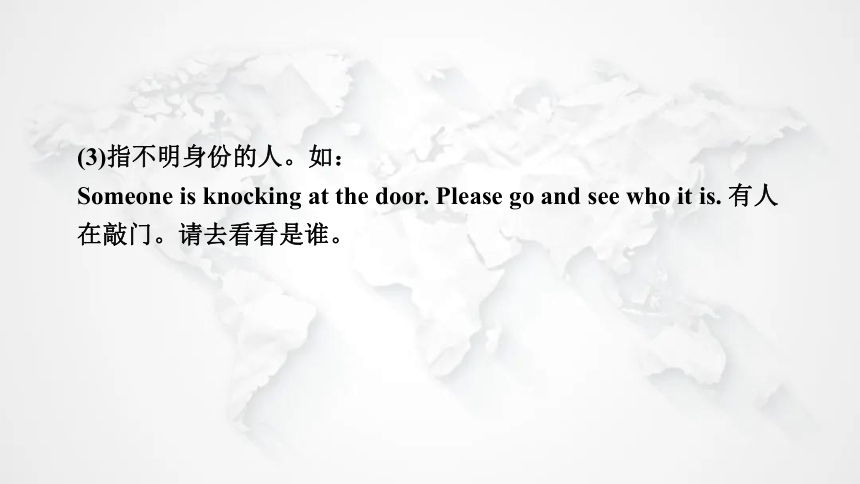
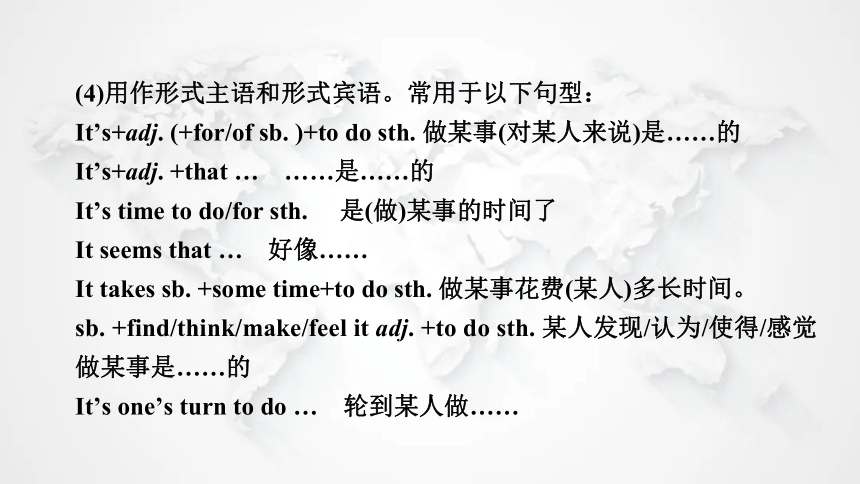
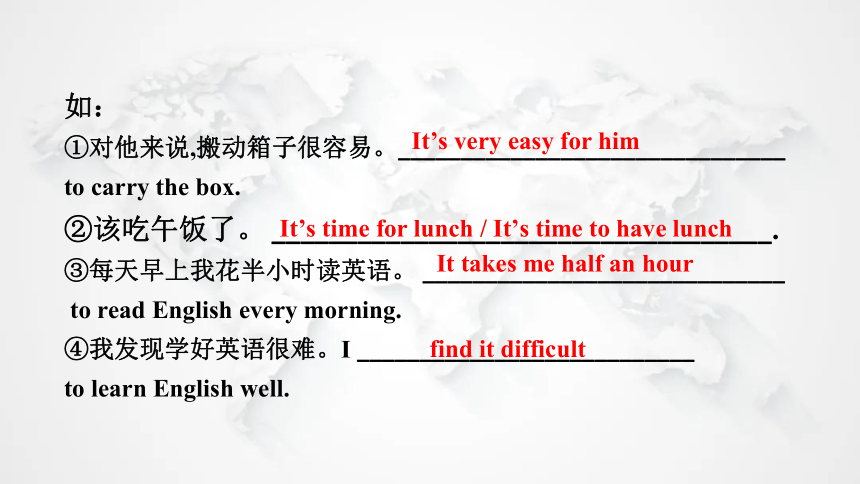
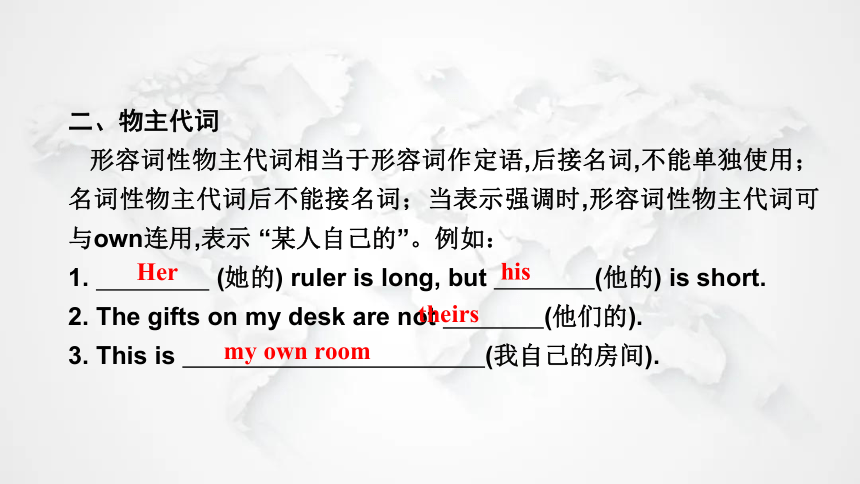
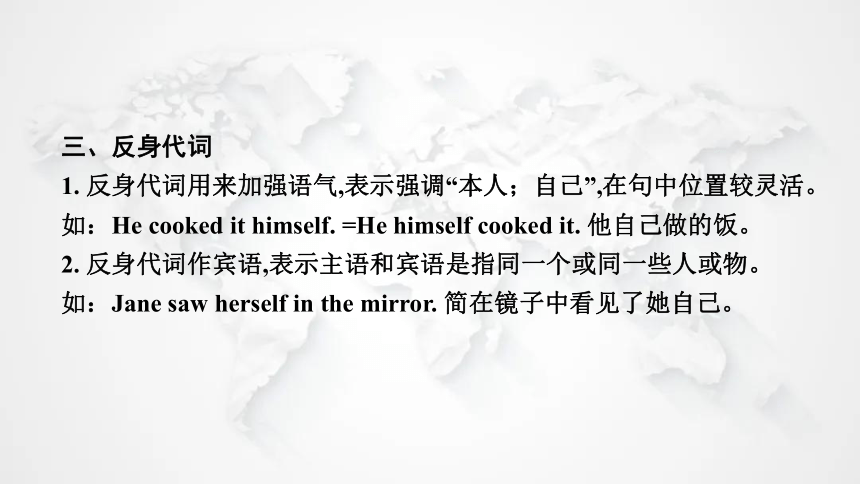
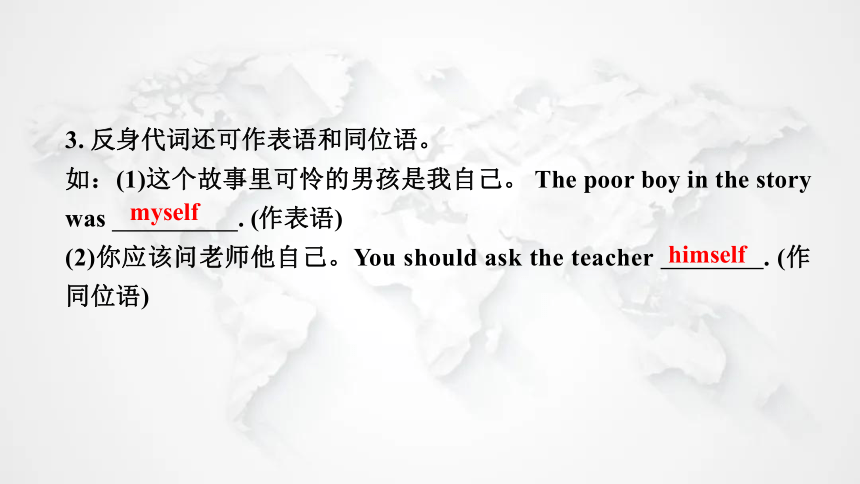
文档简介
(共53张PPT)
考点解读
01
KAO DIAN JIE DU
满分突破
02
MAN FEN TU PO
真题链接
03
ZHEN TI LIAN JIE
CONTENTS
目录
模拟突破
04
MO NI TU PO
考点解读
KAO DIAN JIE DU
PART ONE
01
第四节 代 词
代词是代替名词的一种词类,大多数代词具有名词和形容词的功能。新课程标准中,代词考查包括:人称代词、物主代词、反身代词、指示代词、不定代词、疑问代词。中考命题常设情景干扰,特殊语境中代词的意义和功能,替代词的选择是常考热点。
人称代词5年2考,物主代词5年5考,反身代词5年2考,指示代词5年0考,不定代词5年0考,疑问代词5年0考。
一、人称代词
1. 人称代词的基本用法
人称代词分为主格和宾格两种形式,用法如下:
用法 例子
(1)作主语(用主格) 她是个好学生。 is a good
student.
(2)作表语(放在系动词之后) —是谁啊?—是我。—Who is there?—It’s .
(3)作宾语(用宾格,放在动词或介词之后) 我在超市看到他了。
I saw in the supermarket.
She
me
him
2. 多个代词的排列顺序
单数按二、三、一人称(you, he and I);复数按一、二、三 (we, you and they);名词后接人称代词(the boss and she)。
3. 代词it的用法
(1)代替上文提到的事物或情况。如:
Look up the word in the dictionary if it is difficult. 如果这个单词太难,就查词典。
(2)用来指天气、时间、距离等。如:
It is raining outside. Don’t go out! 外面正在下雨。不用出去了!
It was half past five when John got up. 约翰起床时已经五点半了。
It is very far from the school to the market. 从学校到市场的路很远。
(3)指不明身份的人。如:
Someone is knocking at the door. Please go and see who it is. 有人在敲门。请去看看是谁。
(4)用作形式主语和形式宾语。常用于以下句型:
It’s+adj. (+for/of sb. )+to do sth. 做某事(对某人来说)是……的
It’s+adj. +that … ……是……的
It’s time to do/for sth. 是(做)某事的时间了
It seems that … 好像……
It takes sb. +some time+to do sth. 做某事花费(某人)多长时间。
sb. +find/think/make/feel it adj. +to do sth. 某人发现/认为/使得/感觉做某事是……的
It’s one’s turn to do … 轮到某人做……
如:
①对他来说,搬动箱子很容易。_______________________________ to carry the box.
②该吃午饭了。 ___________________________________.
③每天早上我花半小时读英语。 _____________________________
to read English every morning.
④我发现学好英语很难。I ___________________________
to learn English well.
It’s very easy for him
It’s time for lunch / It’s time to have lunch
It takes me half an hour
find it difficult
二、物主代词
形容词性物主代词相当于形容词作定语,后接名词,不能单独使用;名词性物主代词后不能接名词;当表示强调时,形容词性物主代词可与own连用,表示 “某人自己的”。例如:
1. (她的) ruler is long, but (他的) is short.
2. The gifts on my desk are not (他们的).
3. This is (我自己的房间).
Her
his
theirs
my own room
三、反身代词
1. 反身代词用来加强语气,表示强调“本人;自己”,在句中位置较灵活。
如:He cooked it himself. =He himself cooked it. 他自己做的饭。
2. 反身代词作宾语,表示主语和宾语是指同一个或同一些人或物。
如:Jane saw herself in the mirror. 简在镜子中看见了她自己。
3. 反身代词还可作表语和同位语。
如:(1)这个故事里可怜的男孩是我自己。 The poor boy in the story was . (作表语)
(2)你应该问老师他自己。You should ask the teacher . (作同位语)
myself
himself
4. 与反身代词搭配的常用词组有:
(1)learn by oneself (自学)=__________________________
(2) __________________________ (为自己)
(3) __________________________ (玩得开心)
(4) __________________________(随便吃)
(5) __________________________(自己穿衣)
(6) __________________________(使某人感到宾至如归)
teach oneself
for oneself
enjoy oneself
help oneself (to)
dress oneself
make oneself at home
(7) __________________________(苏醒)
(8) __________________________(自言自语)
(9) ___________________________________(照顾自己)
(10) __________________________(沉溺于……)
(11) __________________________(致力于……)
come to oneself
say to oneself
look after oneself / take care of oneself
lose oneself in (doing)…
devote oneself to …
四、指示代词
指示代词包括this, that, these, those。具体用法如下:
1. this和these一般指时间或空间上较近的人或事物,that和those则指时间或空间上较远的人或事物。如:
(1)这个是我的足球,那个是你的足球。 is my football, and
is your football.
(2)这些是我的姐姐们,那些是我的哥哥们。 are my sisters, and are my brothers.
This
that
These
those
2. 为了避免重复,常用that或those 指代前面的讲过的事物(that指代不可数名词或可数名词单数,those指代可数名词复数),而this, these常用来指后面的提到的事物。如:
(1)广州的天气比北京好得多。
The weather of Guangzhou is much better than of Beijing.
(2)我想说的是:英语非常重要。What I want to say is :English is very important.
that
this
3. 打电话时,常用this 指代自己,that指代对方。如:
我是玛丽,请问你是谁? is Mary speaking. Who’s
, please?
This
that
五、不定代词
不定代词分为普通不定代词和复合不定代词。
几组常用的不定代词比较
序号 不定代词 用法 例子
1 some (1)多用于肯定句,表示“一些;几个”
(2)也可以用于疑问句中表示请求,邀请
(3)指代或修饰不可数名词或可数名词复数 ①Would you like ________
coffee?
②Have you got __________
tea?
③There isn’t orange in the bottle.
④If you have____________
question(s),please ask me.
any (1)多用于疑问句、否定句和条件状语从句中,表示“一些;任何”
(2)表示“任何”的意思时,可用于肯定句或条件状语从句
(3)指代或修饰不可数名词或可数名词复数
some
any
any
any
几组常用的不定代词比较
序号 不定代词 用法 例子
2 many (1)用来指代或修饰可数名词复数
(2)可与a lot of, lots of, plenty of换用 ① students in our class come from Foshan.
②Don’t eat too junk food.
much (1)用来指代或修饰不可数名词
(2)可与a lot of, lots of, plenty of换用
Many
much
几组常用的不定代词比较
序号 不定代词 用法 例子
3 few (1)表示“几乎没有”,表否定
(2)指代或修饰可数名词复数 ① (很少)of us can speak Japanese.
②There are only (几个)students in the classroom.
③There is (很少)water in the bottle, so I have to fetch some.
④I’m (有点)hungry.
a few (1)表示“几个”,表肯定
(2)前面由only, just修饰时使用
(3)指代或修饰可数名词复数
little (1)表示“几乎没有”,表否定
(2)指代或修饰不可数名词
a little (1)表示“有一点”,表肯定
(2)与only, just连用
(3)也可以用作副词,表示“有点;稍微”,相当于kind of, a bit的用法
(4)指代或修饰不可数名词
Few
a few
little
a little
几组常用的不定代词比较
序号 不定代词 用法 例子
4 all (1)表示三者或三者以上“都”
(2)用于指代或修饰不可数名词或可数名词复数
(3)放在定冠词或形容词性物主代词之前
(4)放在系动词、情态动词或助动词之后,行为动词之前 ① (所有的)the water has been used up.
②The students (都喜欢)their city.
③There are tall trees on (两)sides of the street.
④—How are your parents?
—They (都)fine.
⑤ (莉莉和露西都)are interested in it.
both (1)表示两者“都”
(2)用于指代或修饰可数名词复数
(3)both…and…表示“既……又……,两个都”,谓语用复数
(4)放在定冠词或形容词性物主代词之前
(5)放在系动词/情态动词/助动词之后,行为动词之前
All
all like
both
are both
Both Lily and Lucy
几组常用的不定代词比较
序号 不定代词 用法 例子
5 either (1)指“两者中的任何一个”
(2)做主语时,谓语动词用单数
(3)主语由either…or…(要么……要么……)连接时,谓语遵从就近原则 ①—Which do you prefer, tea or coffee?
— (哪一个)is OK. I don’t mind.
② (要么你要么我)am going to the meeting.
③ (两个都不)of the answers is right.
④ (我们和她哥哥都不)likes the book.
neither (1)指“(两者中)一个也不”,属于全部否定
(2)做主语时,谓语动词用单数
(3)主语由neither…nor…(既不……也不……)连接时,谓语遵从就近原则
Either
Either you or I
Neither
Neither we nor her brother
几组常用的不定代词比较
序号 不定代词 用法 例子
6 each (1)可用于两者或以上中的每一个人或物
(2)作代词时,后接of短语
(3)作形容词时,后接名词单数 ①There are many trees on_________
side of the road.
② of us has an English-Chinese dictionary.
③ student loves their English teacher. =All the students love their English teacher.
every (1)用于三者或三者以上每一个人或物
(2)只用作形容词,后接名词单数
each
Each
Every
几组常用的不定代词比较
序号 不定代词 用法 例子
7 none (1)表示三者或三者以上人或物,“没有一个”,表示全部否定
(2)后接of…,作主语时,谓语动词可用单数或复数 ① of the answers is/are right.
②—How many students are here?
— .
③—Who is in the classroom?
— . /Nobody.
no one/
nobody (1)指人,作主语时,谓语动词用单数
(2)后不接of结构
(3)表示否定
None
None
No one
几组常用的不定代词比较
序号 不定代词 用法 例子
8 others 表复数,泛指,相当于“other+复数名词”;后不接名词 ①We think so, but ___________
may not think in this way.
②He is ready to help_________ .
③Tony has taken three oranges. But where are on the table?
the
others 相当于“the other+复数名词”,表特指;后不接名词
others
others
the others
几组常用的不定代词比较
序号 不定代词 用法 例子
9 other (1)形容词,后接复数名词
(2)any other后常接单数,表示“其他任何一个” ①He is taller than any student in his class.
②He has two brothers. One is 10 years old, and
is 5 years old.
③Only Lily and Lucy are in the classroom. Where have students gone?
④Mary doesn’t want to buy this skirt. Would you please show her one?
⑤I’m still hungry after eating the cake. Please give me .
⑥I need three hours to finish the work.
=I need three more hours to finish the work.
the
other (1)表示(两者中的)另一个
(2)后接复数名词,表示“其余的……”(特指)
another (1)表单数,表示三者或三者以上之中的另一个
(2)当与数词连用时,可接复数名词
other
the other
the other
another
another
another
六、疑问代词
用来提出问题的代词称为疑问代词,通常位于句首,引导特殊疑问句。
1. who 作主语、表语或宾语,但不能放介词后。可询问身份和姓名。
如:(1)Who wants to go with me?
(2)— is the boy in red? — He is Jim.
2. whom 是who的宾格形式,作宾语。
如:To are you talking?
Who
whom
3. whose 是who的所有格形式,作定语。
如:这是谁的钱包? wallet is this?
4. what指不定数目中的那一个。表示“什么;哪一些”,无范围,也可用于询问职业。
如:(1) would you like?
(2)— does your father do? — He is a teacher.
5. which表示“哪一个”,指在一定范围内特指的人或物。
如: bike is yours?
Whose
What
What
Which
七、易错点突破
1. some, any, every, no与one, body, thing构成复合不定代词,如someone, anybody, everything等,修饰这一类复合不定代词时,定语要后置。如:
(1)Is there (任何新的事) in today’s newspaper?
(2)Would you like (别的东西)?
2. 指人的复合不定代词作主语时,谓语动词用单数形式。
如:If anyone (来),ask him to wait.
anything new
something else
comes
3. 不定代词one指物时,指代同一类中不特定的单数名词,一般指代“a/an+单数名词”,其复数形式为ones;it指上文提到的同一事物,其复数形式为they/them。如:
(1)I can’t find my hat. I think I have to buy .
我找不到我的帽子了,我想我得去买一顶。 (同名不同物)
(2)I can’t find my hat. I don’t know where I put .
我找不到我的帽子,我不知道把它放在哪了。(同一物)
one
it
满分突破
MAN FEN TU PO
PART TWO
02
在语法选择和短文填空中,代词主要考查其性、数、格。其主要是根据句子结构和上下文来确定,根据固定搭配确定的情况相对较少。
一、代词在语法选择中的考查
1. (2023·广东中考·32 题)At the age of seven,David had first astronaut (宇航员) training experience.
A. he B. him C. his
C
2. (2023·佛山市南海区模拟·35 题)Later, Peng posted first
video of playing guzheng on the streets online and it quickly went viral (走红).
A. she B. hers C. her
3. (2022·广州中考·3 题)Sometimes, I would draw pictures of ________
fish and sea plants and tape them to the side of the tank, so Bob wouldn’t get lonely while I was at school.
A. other B. others C. the other D. the others
C
A
4. (2022·广东中考·15题)All seemed so easy. I hoped the next time I would be able to clean the tank all by .
A. me B. my C. mine D. myself
5. (2021·广东中考·33 题)Workers started to build the bridge in May,
2018. cost 2. 8 million dollars and took over two years to complete.
A. It B. Its C. They D. Theirs
D
A
6. (2021·广州中考·9题)I’ll go down to show my support, if I can’t do
_____________more.
A. something B. everything C. anything D. nothing
7. (2021·广州中考·12题)By this time other raindrops had seen what
did. One said, “If you two are doing such a good job, I shall follow!”
A. you B. they C. it D. he
C
B
8. (2020·广州中考·10 题)They move on until at last, David sees some
houses below. The children run to meet .
A. he B. his C. him D. himself
9. (2020·广州中考·1 题)As soon as he reads one book, he brings home
. Soon the house is filled with books.
A. other B. another C. the other D. the others
C
B
二、代词在短文填空中的考查
1.
(2023·广东中考·66 题)There is a small thing we use every day. We usually put in the bathroom.
2. (2022·广东中考·75 题)The first International Tea Day was on May 21st, 2020. Since then, people have celebrated every year.
it either be because what else by invent clean popular habit hundred
it
it
3. (2021· 广东中考· 66题)One man has turned his interest into love and this love made write many books about China.
4. (2020· 广东中考· 74题)She felt very excited when she saw smiles on
___________faces.
5. (2020·佛山市顺德区二模·75 题)He thanked God for saving_______
lives.
him
their
their
6. (2019· 广东中考· 74题)In order to save the old village, Grandpa Huang painted on the walls of own house and other houses.
7. (2018·广东中考·80题)… he will look back to this experience and keep telling , “one brick at a time”.
his
himself
8. (2017·广东中考·73题)… they find that Mr. Smith, Mrs. Smith and their two sons are so crazy about technology that hardly do things together.
9. (2016·广东中考·79题)We should try best to care for our family.
they
our
真题链接
ZHEN TI LIAN JIE
PART THREE
03
( )1. — Where did you get the toy car?
— From Betty. She made it . (2023·河北省)
A. myself B. himself C. herself D. yourself
C
( )2. — Chinese chess player Ding Liren has done he can in chess and has put all that he has into the games.
— Yes, and he has become chess world champion (冠军) recently. (2023·滨州市)
A. everything B. nothing C. something D. none
A
( )3. teacher talked to about the stories of the Silk Road. (2023·天津市)
A. Our; us B. Our; we C. Ours; us D. Ours; we
( )4. — Which of the two T-shirts do you want?
— . One is too big and the other is too small. Could you show me another one?
(2023·甘南自治州)
A. Either B. Both C. Neither
A
C
( )5. — It’s neither too cold nor too hot all year round in Kunming, making a perfect place to live in or visit.
— Right. I went there last year. (2023·南通市)
A. that B. one C. this D. it
D
( )6. The Robinsons love seeing the world. have been to many interesting places.
(2023·大连市)
A. We B. They C. You D. I
( )7. To surprise, local villagers are successful in planting strawberries without soil in Hainan. (2023·青海省)
A. we B. our C. us
B
B
( )8. — Tim, is this magazine your sister’s?
— No. is on the desk. (2023·哈尔滨市)
A. Mine B. Hers C. His
( )9. — I can’t find my shoes. Where are they, Mom?
— Oh, one is under the bed, is behind the door. (2023·邵阳市)
A. the other B. others C. another
B
A
( )10. — There are many celebrations in the coming Dragon Boat Festival.
— Sounds very interesting. I don’t want to miss . (2023· 武汉市)
A. it B. any C. none D. one
B
模拟突破
MO NI TU PO
PART FOUR
04
语法选择(主要考查代词)(2023·高州市一模改编)
Jessie and her two young sisters lived with their mother in an apartment building. One evening, a fire started on 1 second floor of the building. The smoke 2 spread through the whole building. The fire alarm rang sharply. All the people ran out of the burning building. There was no time to take money 3 food. They ran outside to safety in a hurry.
Soon, the firefighters arrived. They were trying to control the fire so that it wouldn’t spread to buildings nearby. The small fire soon turned into a huge flame. Standing in horror, the children watched 4 apartment building burn for hours. Finally, it collapsed (倒塌). All of a sudden, this family and twelve 5 families in the same building were homeless. Their world 6 upside down.
All the families were put in a hotel for the night. That immediate help came from the Red Cross office. But how would they get their lives back 7 normal? Their neighbors, friends, relatives and strangers came to help. 8 brought clothes, food, money and even teddy bears. A week later, all the families moved into their newly rented houses.
Jessie’s mother told her children later, “So many people have helped 9 in this disaster. We must never forget 10 they have done for us. ”
( )1. A. a B. the C. an
( )2. A. quickly B. quick C. quicker
( )3. A. but B. and C. or
( )4. A. them B. their C. theirs
( )5. A. the other B. another C. other
( )6. A. turned B. was turned C. are turned
( )7. A. to B. for C. in
( )8. A. They B. Them C. Their
( )9. A. us B. we C. our
( )10. A. why B. what C. where
B
A
C
B
C
B
A
A
A
B
考点解读
01
KAO DIAN JIE DU
满分突破
02
MAN FEN TU PO
真题链接
03
ZHEN TI LIAN JIE
CONTENTS
目录
模拟突破
04
MO NI TU PO
考点解读
KAO DIAN JIE DU
PART ONE
01
第四节 代 词
代词是代替名词的一种词类,大多数代词具有名词和形容词的功能。新课程标准中,代词考查包括:人称代词、物主代词、反身代词、指示代词、不定代词、疑问代词。中考命题常设情景干扰,特殊语境中代词的意义和功能,替代词的选择是常考热点。
人称代词5年2考,物主代词5年5考,反身代词5年2考,指示代词5年0考,不定代词5年0考,疑问代词5年0考。
一、人称代词
1. 人称代词的基本用法
人称代词分为主格和宾格两种形式,用法如下:
用法 例子
(1)作主语(用主格) 她是个好学生。 is a good
student.
(2)作表语(放在系动词之后) —是谁啊?—是我。—Who is there?—It’s .
(3)作宾语(用宾格,放在动词或介词之后) 我在超市看到他了。
I saw in the supermarket.
She
me
him
2. 多个代词的排列顺序
单数按二、三、一人称(you, he and I);复数按一、二、三 (we, you and they);名词后接人称代词(the boss and she)。
3. 代词it的用法
(1)代替上文提到的事物或情况。如:
Look up the word in the dictionary if it is difficult. 如果这个单词太难,就查词典。
(2)用来指天气、时间、距离等。如:
It is raining outside. Don’t go out! 外面正在下雨。不用出去了!
It was half past five when John got up. 约翰起床时已经五点半了。
It is very far from the school to the market. 从学校到市场的路很远。
(3)指不明身份的人。如:
Someone is knocking at the door. Please go and see who it is. 有人在敲门。请去看看是谁。
(4)用作形式主语和形式宾语。常用于以下句型:
It’s+adj. (+for/of sb. )+to do sth. 做某事(对某人来说)是……的
It’s+adj. +that … ……是……的
It’s time to do/for sth. 是(做)某事的时间了
It seems that … 好像……
It takes sb. +some time+to do sth. 做某事花费(某人)多长时间。
sb. +find/think/make/feel it adj. +to do sth. 某人发现/认为/使得/感觉做某事是……的
It’s one’s turn to do … 轮到某人做……
如:
①对他来说,搬动箱子很容易。_______________________________ to carry the box.
②该吃午饭了。 ___________________________________.
③每天早上我花半小时读英语。 _____________________________
to read English every morning.
④我发现学好英语很难。I ___________________________
to learn English well.
It’s very easy for him
It’s time for lunch / It’s time to have lunch
It takes me half an hour
find it difficult
二、物主代词
形容词性物主代词相当于形容词作定语,后接名词,不能单独使用;名词性物主代词后不能接名词;当表示强调时,形容词性物主代词可与own连用,表示 “某人自己的”。例如:
1. (她的) ruler is long, but (他的) is short.
2. The gifts on my desk are not (他们的).
3. This is (我自己的房间).
Her
his
theirs
my own room
三、反身代词
1. 反身代词用来加强语气,表示强调“本人;自己”,在句中位置较灵活。
如:He cooked it himself. =He himself cooked it. 他自己做的饭。
2. 反身代词作宾语,表示主语和宾语是指同一个或同一些人或物。
如:Jane saw herself in the mirror. 简在镜子中看见了她自己。
3. 反身代词还可作表语和同位语。
如:(1)这个故事里可怜的男孩是我自己。 The poor boy in the story was . (作表语)
(2)你应该问老师他自己。You should ask the teacher . (作同位语)
myself
himself
4. 与反身代词搭配的常用词组有:
(1)learn by oneself (自学)=__________________________
(2) __________________________ (为自己)
(3) __________________________ (玩得开心)
(4) __________________________(随便吃)
(5) __________________________(自己穿衣)
(6) __________________________(使某人感到宾至如归)
teach oneself
for oneself
enjoy oneself
help oneself (to)
dress oneself
make oneself at home
(7) __________________________(苏醒)
(8) __________________________(自言自语)
(9) ___________________________________(照顾自己)
(10) __________________________(沉溺于……)
(11) __________________________(致力于……)
come to oneself
say to oneself
look after oneself / take care of oneself
lose oneself in (doing)…
devote oneself to …
四、指示代词
指示代词包括this, that, these, those。具体用法如下:
1. this和these一般指时间或空间上较近的人或事物,that和those则指时间或空间上较远的人或事物。如:
(1)这个是我的足球,那个是你的足球。 is my football, and
is your football.
(2)这些是我的姐姐们,那些是我的哥哥们。 are my sisters, and are my brothers.
This
that
These
those
2. 为了避免重复,常用that或those 指代前面的讲过的事物(that指代不可数名词或可数名词单数,those指代可数名词复数),而this, these常用来指后面的提到的事物。如:
(1)广州的天气比北京好得多。
The weather of Guangzhou is much better than of Beijing.
(2)我想说的是:英语非常重要。What I want to say is :English is very important.
that
this
3. 打电话时,常用this 指代自己,that指代对方。如:
我是玛丽,请问你是谁? is Mary speaking. Who’s
, please?
This
that
五、不定代词
不定代词分为普通不定代词和复合不定代词。
几组常用的不定代词比较
序号 不定代词 用法 例子
1 some (1)多用于肯定句,表示“一些;几个”
(2)也可以用于疑问句中表示请求,邀请
(3)指代或修饰不可数名词或可数名词复数 ①Would you like ________
coffee?
②Have you got __________
tea?
③There isn’t orange in the bottle.
④If you have____________
question(s),please ask me.
any (1)多用于疑问句、否定句和条件状语从句中,表示“一些;任何”
(2)表示“任何”的意思时,可用于肯定句或条件状语从句
(3)指代或修饰不可数名词或可数名词复数
some
any
any
any
几组常用的不定代词比较
序号 不定代词 用法 例子
2 many (1)用来指代或修饰可数名词复数
(2)可与a lot of, lots of, plenty of换用 ① students in our class come from Foshan.
②Don’t eat too junk food.
much (1)用来指代或修饰不可数名词
(2)可与a lot of, lots of, plenty of换用
Many
much
几组常用的不定代词比较
序号 不定代词 用法 例子
3 few (1)表示“几乎没有”,表否定
(2)指代或修饰可数名词复数 ① (很少)of us can speak Japanese.
②There are only (几个)students in the classroom.
③There is (很少)water in the bottle, so I have to fetch some.
④I’m (有点)hungry.
a few (1)表示“几个”,表肯定
(2)前面由only, just修饰时使用
(3)指代或修饰可数名词复数
little (1)表示“几乎没有”,表否定
(2)指代或修饰不可数名词
a little (1)表示“有一点”,表肯定
(2)与only, just连用
(3)也可以用作副词,表示“有点;稍微”,相当于kind of, a bit的用法
(4)指代或修饰不可数名词
Few
a few
little
a little
几组常用的不定代词比较
序号 不定代词 用法 例子
4 all (1)表示三者或三者以上“都”
(2)用于指代或修饰不可数名词或可数名词复数
(3)放在定冠词或形容词性物主代词之前
(4)放在系动词、情态动词或助动词之后,行为动词之前 ① (所有的)the water has been used up.
②The students (都喜欢)their city.
③There are tall trees on (两)sides of the street.
④—How are your parents?
—They (都)fine.
⑤ (莉莉和露西都)are interested in it.
both (1)表示两者“都”
(2)用于指代或修饰可数名词复数
(3)both…and…表示“既……又……,两个都”,谓语用复数
(4)放在定冠词或形容词性物主代词之前
(5)放在系动词/情态动词/助动词之后,行为动词之前
All
all like
both
are both
Both Lily and Lucy
几组常用的不定代词比较
序号 不定代词 用法 例子
5 either (1)指“两者中的任何一个”
(2)做主语时,谓语动词用单数
(3)主语由either…or…(要么……要么……)连接时,谓语遵从就近原则 ①—Which do you prefer, tea or coffee?
— (哪一个)is OK. I don’t mind.
② (要么你要么我)am going to the meeting.
③ (两个都不)of the answers is right.
④ (我们和她哥哥都不)likes the book.
neither (1)指“(两者中)一个也不”,属于全部否定
(2)做主语时,谓语动词用单数
(3)主语由neither…nor…(既不……也不……)连接时,谓语遵从就近原则
Either
Either you or I
Neither
Neither we nor her brother
几组常用的不定代词比较
序号 不定代词 用法 例子
6 each (1)可用于两者或以上中的每一个人或物
(2)作代词时,后接of短语
(3)作形容词时,后接名词单数 ①There are many trees on_________
side of the road.
② of us has an English-Chinese dictionary.
③ student loves their English teacher. =All the students love their English teacher.
every (1)用于三者或三者以上每一个人或物
(2)只用作形容词,后接名词单数
each
Each
Every
几组常用的不定代词比较
序号 不定代词 用法 例子
7 none (1)表示三者或三者以上人或物,“没有一个”,表示全部否定
(2)后接of…,作主语时,谓语动词可用单数或复数 ① of the answers is/are right.
②—How many students are here?
— .
③—Who is in the classroom?
— . /Nobody.
no one/
nobody (1)指人,作主语时,谓语动词用单数
(2)后不接of结构
(3)表示否定
None
None
No one
几组常用的不定代词比较
序号 不定代词 用法 例子
8 others 表复数,泛指,相当于“other+复数名词”;后不接名词 ①We think so, but ___________
may not think in this way.
②He is ready to help_________ .
③Tony has taken three oranges. But where are on the table?
the
others 相当于“the other+复数名词”,表特指;后不接名词
others
others
the others
几组常用的不定代词比较
序号 不定代词 用法 例子
9 other (1)形容词,后接复数名词
(2)any other后常接单数,表示“其他任何一个” ①He is taller than any student in his class.
②He has two brothers. One is 10 years old, and
is 5 years old.
③Only Lily and Lucy are in the classroom. Where have students gone?
④Mary doesn’t want to buy this skirt. Would you please show her one?
⑤I’m still hungry after eating the cake. Please give me .
⑥I need three hours to finish the work.
=I need three more hours to finish the work.
the
other (1)表示(两者中的)另一个
(2)后接复数名词,表示“其余的……”(特指)
another (1)表单数,表示三者或三者以上之中的另一个
(2)当与数词连用时,可接复数名词
other
the other
the other
another
another
another
六、疑问代词
用来提出问题的代词称为疑问代词,通常位于句首,引导特殊疑问句。
1. who 作主语、表语或宾语,但不能放介词后。可询问身份和姓名。
如:(1)Who wants to go with me?
(2)— is the boy in red? — He is Jim.
2. whom 是who的宾格形式,作宾语。
如:To are you talking?
Who
whom
3. whose 是who的所有格形式,作定语。
如:这是谁的钱包? wallet is this?
4. what指不定数目中的那一个。表示“什么;哪一些”,无范围,也可用于询问职业。
如:(1) would you like?
(2)— does your father do? — He is a teacher.
5. which表示“哪一个”,指在一定范围内特指的人或物。
如: bike is yours?
Whose
What
What
Which
七、易错点突破
1. some, any, every, no与one, body, thing构成复合不定代词,如someone, anybody, everything等,修饰这一类复合不定代词时,定语要后置。如:
(1)Is there (任何新的事) in today’s newspaper?
(2)Would you like (别的东西)?
2. 指人的复合不定代词作主语时,谓语动词用单数形式。
如:If anyone (来),ask him to wait.
anything new
something else
comes
3. 不定代词one指物时,指代同一类中不特定的单数名词,一般指代“a/an+单数名词”,其复数形式为ones;it指上文提到的同一事物,其复数形式为they/them。如:
(1)I can’t find my hat. I think I have to buy .
我找不到我的帽子了,我想我得去买一顶。 (同名不同物)
(2)I can’t find my hat. I don’t know where I put .
我找不到我的帽子,我不知道把它放在哪了。(同一物)
one
it
满分突破
MAN FEN TU PO
PART TWO
02
在语法选择和短文填空中,代词主要考查其性、数、格。其主要是根据句子结构和上下文来确定,根据固定搭配确定的情况相对较少。
一、代词在语法选择中的考查
1. (2023·广东中考·32 题)At the age of seven,David had first astronaut (宇航员) training experience.
A. he B. him C. his
C
2. (2023·佛山市南海区模拟·35 题)Later, Peng posted first
video of playing guzheng on the streets online and it quickly went viral (走红).
A. she B. hers C. her
3. (2022·广州中考·3 题)Sometimes, I would draw pictures of ________
fish and sea plants and tape them to the side of the tank, so Bob wouldn’t get lonely while I was at school.
A. other B. others C. the other D. the others
C
A
4. (2022·广东中考·15题)All seemed so easy. I hoped the next time I would be able to clean the tank all by .
A. me B. my C. mine D. myself
5. (2021·广东中考·33 题)Workers started to build the bridge in May,
2018. cost 2. 8 million dollars and took over two years to complete.
A. It B. Its C. They D. Theirs
D
A
6. (2021·广州中考·9题)I’ll go down to show my support, if I can’t do
_____________more.
A. something B. everything C. anything D. nothing
7. (2021·广州中考·12题)By this time other raindrops had seen what
did. One said, “If you two are doing such a good job, I shall follow!”
A. you B. they C. it D. he
C
B
8. (2020·广州中考·10 题)They move on until at last, David sees some
houses below. The children run to meet .
A. he B. his C. him D. himself
9. (2020·广州中考·1 题)As soon as he reads one book, he brings home
. Soon the house is filled with books.
A. other B. another C. the other D. the others
C
B
二、代词在短文填空中的考查
1.
(2023·广东中考·66 题)There is a small thing we use every day. We usually put in the bathroom.
2. (2022·广东中考·75 题)The first International Tea Day was on May 21st, 2020. Since then, people have celebrated every year.
it either be because what else by invent clean popular habit hundred
it
it
3. (2021· 广东中考· 66题)One man has turned his interest into love and this love made write many books about China.
4. (2020· 广东中考· 74题)She felt very excited when she saw smiles on
___________faces.
5. (2020·佛山市顺德区二模·75 题)He thanked God for saving_______
lives.
him
their
their
6. (2019· 广东中考· 74题)In order to save the old village, Grandpa Huang painted on the walls of own house and other houses.
7. (2018·广东中考·80题)… he will look back to this experience and keep telling , “one brick at a time”.
his
himself
8. (2017·广东中考·73题)… they find that Mr. Smith, Mrs. Smith and their two sons are so crazy about technology that hardly do things together.
9. (2016·广东中考·79题)We should try best to care for our family.
they
our
真题链接
ZHEN TI LIAN JIE
PART THREE
03
( )1. — Where did you get the toy car?
— From Betty. She made it . (2023·河北省)
A. myself B. himself C. herself D. yourself
C
( )2. — Chinese chess player Ding Liren has done he can in chess and has put all that he has into the games.
— Yes, and he has become chess world champion (冠军) recently. (2023·滨州市)
A. everything B. nothing C. something D. none
A
( )3. teacher talked to about the stories of the Silk Road. (2023·天津市)
A. Our; us B. Our; we C. Ours; us D. Ours; we
( )4. — Which of the two T-shirts do you want?
— . One is too big and the other is too small. Could you show me another one?
(2023·甘南自治州)
A. Either B. Both C. Neither
A
C
( )5. — It’s neither too cold nor too hot all year round in Kunming, making a perfect place to live in or visit.
— Right. I went there last year. (2023·南通市)
A. that B. one C. this D. it
D
( )6. The Robinsons love seeing the world. have been to many interesting places.
(2023·大连市)
A. We B. They C. You D. I
( )7. To surprise, local villagers are successful in planting strawberries without soil in Hainan. (2023·青海省)
A. we B. our C. us
B
B
( )8. — Tim, is this magazine your sister’s?
— No. is on the desk. (2023·哈尔滨市)
A. Mine B. Hers C. His
( )9. — I can’t find my shoes. Where are they, Mom?
— Oh, one is under the bed, is behind the door. (2023·邵阳市)
A. the other B. others C. another
B
A
( )10. — There are many celebrations in the coming Dragon Boat Festival.
— Sounds very interesting. I don’t want to miss . (2023· 武汉市)
A. it B. any C. none D. one
B
模拟突破
MO NI TU PO
PART FOUR
04
语法选择(主要考查代词)(2023·高州市一模改编)
Jessie and her two young sisters lived with their mother in an apartment building. One evening, a fire started on 1 second floor of the building. The smoke 2 spread through the whole building. The fire alarm rang sharply. All the people ran out of the burning building. There was no time to take money 3 food. They ran outside to safety in a hurry.
Soon, the firefighters arrived. They were trying to control the fire so that it wouldn’t spread to buildings nearby. The small fire soon turned into a huge flame. Standing in horror, the children watched 4 apartment building burn for hours. Finally, it collapsed (倒塌). All of a sudden, this family and twelve 5 families in the same building were homeless. Their world 6 upside down.
All the families were put in a hotel for the night. That immediate help came from the Red Cross office. But how would they get their lives back 7 normal? Their neighbors, friends, relatives and strangers came to help. 8 brought clothes, food, money and even teddy bears. A week later, all the families moved into their newly rented houses.
Jessie’s mother told her children later, “So many people have helped 9 in this disaster. We must never forget 10 they have done for us. ”
( )1. A. a B. the C. an
( )2. A. quickly B. quick C. quicker
( )3. A. but B. and C. or
( )4. A. them B. their C. theirs
( )5. A. the other B. another C. other
( )6. A. turned B. was turned C. are turned
( )7. A. to B. for C. in
( )8. A. They B. Them C. Their
( )9. A. us B. we C. our
( )10. A. why B. what C. where
B
A
C
B
C
B
A
A
A
B
同课章节目录
- 词法
- 名词
- 动词和动词短语
- 动词语态
- 动词时态
- 助动词和情态动词
- 非谓语动词
- 冠词
- 代词
- 数词和量词
- 形容词副词及其比较等级
- 介词和介词短语
- 连词和感叹词
- 构词法
- 相似、相近词比较
- 句法
- 陈述句
- 一般疑问句和否定疑问句
- 特殊疑问句及选择疑问句
- 反意疑问句
- 存在句(There be句型)
- 宾语从句
- 定语从句
- 状语从句
- 主谓一致问题
- 简单句
- 并列句
- 复合句
- 主谓一致
- 主、表语从句
- 名词性从句
- 直接引语和间接引语
- 虚拟语气
- 感叹句
- 强调句
- 倒装句
- 祈使句
- 句子的成分
- 句子的分类
- 题型专区
- 单项选择部分
- 易错题
- 完形填空
- 阅读理解
- 词汇练习
- 听说训练
- 句型转换
- 补全对话
- 短文改错
- 翻译
- 书面表达
- 任务型阅读
- 语法填空
- 其他资料
